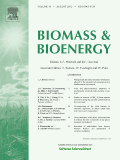
BIOMASS & BIOENERGY
Scope & Guideline
Navigating the Path to Renewable Energy Excellence
Introduction
Aims and Scopes
- Biomass Conversion Technologies:
The journal focuses on various biomass conversion technologies, including thermochemical, biochemical, and catalytic processes. This includes studies on gasification, pyrolysis, anaerobic digestion, and hydrothermal liquefaction. - Sustainability and Environmental Impact:
Research that assesses the sustainability of biomass and bioenergy systems is a core area, emphasizing life cycle analysis, carbon footprint assessments, and the environmental implications of biomass utilization. - Biofuels and Renewable Energy Production:
A significant focus on biofuels, such as biodiesel, bioethanol, and biogas, with an emphasis on their production methods, efficiency, and potential for reducing reliance on fossil fuels. - Waste Valorization:
The journal explores innovative methods for valorizing agricultural and forestry wastes, municipal solid wastes, and industrial by-products for energy production and material recovery. - Biomass Resource Management and Policy:
Research addressing the management of biomass resources, including policy implications, economic analysis, and socio-economic factors influencing biomass energy adoption. - Microalgae and Other Non-Traditional Biomass Sources:
The journal also covers advancements in the use of microalgae and other non-traditional biomass sources for energy production, emphasizing their unique advantages and challenges.
Trending and Emerging
- Integrated Biorefinery Concepts:
There is an increasing trend towards integrated biorefinery approaches that combine multiple biomass conversion technologies to maximize resource efficiency and minimize waste. - Circular Economy Practices:
Research focused on circular economy principles, emphasizing the reuse and recycling of biomass resources, is gaining momentum, highlighting sustainable practices in biomass management. - Advanced Catalytic Processes:
Emerging studies on advanced catalytic processes, including the use of nanomaterials and novel catalysts for biomass conversion, are becoming more prevalent, showcasing innovative approaches to enhance reaction efficiencies. - Microalgae and Synthetic Biology:
The utilization of microalgae and synthetic biology techniques for biofuel production and waste valorization is on the rise, reflecting a growing interest in leveraging these resources for sustainable energy solutions. - Techno-Economic and Life Cycle Assessments:
An increasing emphasis on techno-economic analyses and life cycle assessments indicates a trend towards evaluating the economic viability and environmental impacts of biomass technologies. - Waste-to-Energy Innovations:
Innovative methods for converting waste into energy, including co-digestion and the utilization of agricultural and municipal waste, are emerging as significant themes, reflecting a shift towards sustainable waste management.
Declining or Waning
- Traditional Biomass Feedstocks:
There is a noticeable decrease in research focusing solely on conventional biomass feedstocks like wood and agricultural residues, as attention shifts towards more diverse and sustainable sources such as microalgae and waste biomass. - Basic Theoretical Studies:
Papers that concentrate primarily on theoretical models without practical applications or experimental validation are becoming less common, as the journal encourages more applied research that demonstrates real-world impact. - Single-Process Technologies:
There is a waning interest in studies that focus on single-process technologies without integration into broader bioenergy systems. Current trends favor integrated approaches that combine multiple technologies for enhanced efficiency. - Low-Value Biomass Utilization:
Research on the utilization of low-value biomass is declining, as there is a growing emphasis on high-value applications and the production of biofuels and biochemicals from biomass.
Similar Journals

International Journal of Renewable Energy Research
Pioneering pathways to a sustainable energy future.International Journal of Renewable Energy Research (IJRER) is a distinguished peer-reviewed journal dedicated to advancing the field of renewable energy through innovative research and comprehensive analyses. Published by the esteemed INT JOURNAL RENEWABLE ENERGY RESEARCH, this journal has established itself as a vital resource for academics and industry professionals alike since its inception in 2011. With a focus on a wide array of topics in Energy Engineering and Power Technology and Renewable Energy, Sustainability and the Environment, IJRER has been recognized for its contributions, attaining a Q3 categorization in Energy Engineering and Power Technology and a Q4 rank in Renewable Energy for 2023. The journal is indexed in Scopus, demonstrating its global reach and impact, with notable rankings in both relevant categories. Researchers can access a wealth of valuable insights and findings that are crucial for fostering sustainable practices and technologies. Thus, IJRER plays a pivotal role in driving the future of renewable energy research and innovation.

BioResources
Unleashing the potential of renewable resources for global impact.BioResources is a pioneering open access journal launched in 2006, dedicated to disseminating knowledge at the intersection of bioengineering, environmental engineering, and waste management. Published by NORTH CAROLINA STATE UNIVERSITY DEPARTMENT OF WOOD & PAPER SCIENCE, this journal serves as a vital platform for researchers and professionals to explore the sustainable use of biomaterials and renewable resources. With an impact reflected through its Scopus rankings, including a respectable position in the 2023 quartile rankings across several relevant categories, BioResources is committed to advancing scientific discourse and enhancing the understanding of bioresource utilization. The journal not only supports high-quality research but also encourages contributions that shape environmental policies and practices. Accessible globally, it invites active participation from scholars aiming to contribute to a more sustainable future. Researchers, professionals, and students alike will find valuable insights and groundbreaking research within its pages as it continues to foster knowledge and innovation in the field.
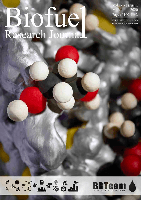
Biofuel Research Journal-BRJ
Championing open access to drive biofuel breakthroughs.Biofuel Research Journal (BRJ) is a premier open-access publication that has been at the forefront of advancing knowledge in the field of biofuels since its inception in 2014. Published by Alpha Creation Enterprise in Malaysia, BRJ disseminates high-quality research that spans multiple disciplines, including Biotechnology, Chemical Engineering, and Environmental Science. With an impressive Q1 ranking across various categories in 2023 and a robust Scopus ranking positioning it among the top journals in its field, BRJ is dedicated to promoting innovative solutions that address contemporary energy challenges. The journal serves as a vital resource for researchers, professionals, and students engaged in sustainable energy, offering a platform for sharing cutting-edge findings and fostering interdisciplinary collaboration. With its commitment to open access, BRJ ensures that its content is widely available, supporting the global pursuit of renewable energy and environmental stewardship.

Frontiers in Energy Research
Exploring diverse pathways in energy studies.Frontiers in Energy Research is a prestigious open-access journal published by FRONTIERS MEDIA SA, dedicated to advancing knowledge in the diverse fields of energy research. Launched in 2013, the journal has established itself as a pivotal platform for disseminating high-quality research, particularly in areas such as Economics and Econometrics, Energy Engineering and Power Technology, and Renewable Energy, Sustainability and the Environment. With a notable impact factor and impressive quartile rankings, including Q2 in multiple categories and a reputation for rigorous peer review, Frontiers in Energy Research offers researchers, professionals, and students alike a vital resource for exploring the latest innovations and insights in energy studies. Operating from its base in Lausanne, Switzerland, this journal is committed to enhancing open accessibility to relevant research, significantly contributing to the global dialogue on energy solutions and sustainability.

Biotechnology for Biofuels and Bioproducts
Empowering a Greener Tomorrow Through Biofuels and BioproductsBiotechnology for Biofuels and Bioproducts is a premier international journal published by BMC, situated in the United Kingdom, focusing on the critical intersection of biotechnology and sustainable energy solutions. Established as an Open Access platform in 2022, this journal aims to disseminate high-quality research that advances our understanding of biofuels, bioproducts, and their applications within environmental sustainability. With its commendable Q2 ranking in multiple relevant categories including Applied Microbiology and Biotechnology and Renewable Energy, this journal serves as a vital resource for researchers, industry professionals, and students seeking to explore innovative biotechnological approaches to address global energy challenges. The journal emphasizes interdisciplinary research, fostering collaboration among scientists in biotechnology, environmental science, and policy-making. As it continues to publish impactful findings until 2024, Biotechnology for Biofuels and Bioproducts remains essential for those dedicated to advancing sustainable methodologies in energy and resource management.
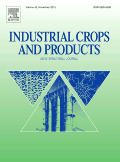
INDUSTRIAL CROPS AND PRODUCTS
Championing Research that Shapes the Agricultural LandscapeINDUSTRIAL CROPS AND PRODUCTS is a premier journal dedicated to the field of agronomy and crop science, published by Elsevier. With an impressive impact factor that places it in the Q1 quartile for its subject category, this journal ranks among the top 29 out of 406 in Agricultural and Biological Sciences, demonstrating its significance and influence within the academic community. Since its inception in 1992, it has been committed to disseminating high-quality research that advances the understanding of industrial crops and their applications. The journal is an excellent resource for researchers, professionals, and students who are keen to explore novel findings, methodologies, and approaches in crop diversification and product development. Although it does not currently offer open access options, it maintains a rigorous peer-review process to ensure that only the most impactful research is published. As it continues to grow and evolve through to 2024, INDUSTRIAL CROPS AND PRODUCTS remains a crucial platform for those looking to make significant contributions to the field.
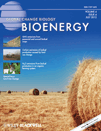
Global Change Biology Bioenergy
Advancing Sustainable Solutions for Global ChangeGlobal Change Biology Bioenergy, published by WILEY, is a leading peer-reviewed journal that focuses on the interplay between biological processes and bioenergy production, contributing significantly to the fields of agronomy, forestry, and environmental sustainability. Established in 2009, this Open Access journal, based in Germany, has gained recognition in the academic community, boasting impressive quartile rankings in 2023: Q1 in Agronomy and Crop Science, Forestry, Renewable Energy, Sustainability and the Environment, and Waste Management and Disposal. With its rigorous publication standards and commitment to disseminating vital research, Global Change Biology Bioenergy ranks highly in various Scopus categories, ensuring that cutting-edge studies reach a broad audience. By providing a platform for innovative research, the journal fosters collaboration and knowledge exchange among researchers, professionals, and students dedicated to tackling the pressing challenges posed by global change and the future of bioenergy.
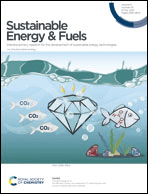
Sustainable Energy & Fuels
Advancing the Future of Energy SolutionsSustainable Energy & Fuels is a leading journal published by the Royal Society of Chemistry, dedicated to advancing knowledge in the fields of energy engineering, fuel technology, and renewable energy solutions. With its ISSN of 2398-4902 and notable Q1 status in both Energy Engineering and Power Technology as well as Fuel Technology, this journal ranks impressively in the Scopus database, ensuring a strong platform for disseminating impactful research. The journal spans a comprehensive scope aimed at addressing the global challenges of sustainable energy, including innovative methodologies and technologies that promote environmental sustainability. Although it operates under a traditional access model, the journal is committed to providing high-quality content that engages researchers, professionals, and students alike. With significant contributions expected through 2024, Sustainable Energy & Fuels stands at the forefront of facilitating scholarly communication, inspiring advancements in energy technologies that align with sustainability goals.

Chemical Product and Process Modeling
Unleashing the potential of mathematical modeling in chemical processes.Chemical Product and Process Modeling is a vital academic journal published by WALTER DE GRUYTER GMBH, focusing on the intricate intersection of chemical engineering and mathematical modeling. Since its inception in 2006, this journal has been instrumental in disseminating significant research findings and methodologies that advance the modeling and simulation of chemical products and processes. With an ISSN of 1934-2659, it caters to a global audience from its base in Berlin, Germany. Although positioned within the Q3 and Q4 quartiles in Chemical Engineering and Modeling & Simulation categories respectively in 2023, it offers a platform for innovative approaches and contributions in these fields, making it a resource for researchers and industry experts alike. Access to the journal's content is offered through subscription models, enabling professionals and academics to stay abreast of the latest developments. In a rapidly evolving scientific landscape, Chemical Product and Process Modeling remains dedicated to enhancing knowledge and fostering collaboration within the chemical engineering community.

Bioresources and Bioprocessing
Fostering Collaboration for a Sustainable FutureBioresources and Bioprocessing is an esteemed open-access journal published by SPRINGER HEIDELBERG, dedicated to the innovative fields of biomedical engineering, biotechnology, food science, and renewable energy. Since its inception in 2014, the journal has rapidly established itself as a leading platform for high-quality research, boasting a Q2 ranking in key categories such as Biomedical Engineering and Biotechnology, and an impressive Q1 status in Food Science for 2023. With robust Scopus rankings placing it in the top percentiles across multiple disciplines, Bioresources and Bioprocessing serves not only as a conduit for original research but also for critical insights into sustainable bioprocessing techniques that contribute to environmental stewardship. It is particularly aimed at researchers, professionals, and students committed to advancing knowledge in the bioprocessing sphere, promoting evidence-based innovations that leverage biological resources for diverse applications. Emphasizing open access, the journal ensures that cutting-edge research is readily available to a global audience, reinforcing its commitment to scientific communication and collaboration.